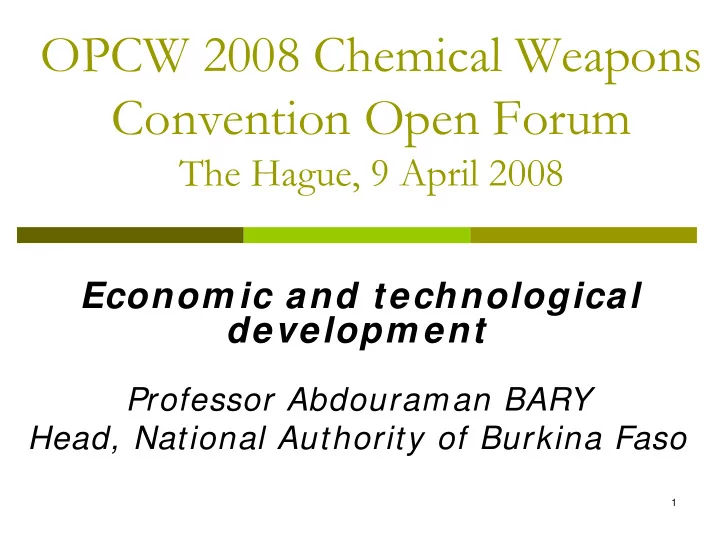

OPCW 2008 Chemical Weapons Convention Open Forum The Hague, 9 April 2008 Econom ic and technological developm ent Professor Abdouraman BARY Head, National Authority of Burkina Faso 1
OUTLINE The role of international cooperation in � the CW C Challenges � I m plem enting the OPCW international � cooperation program s Looking into the future. � Conclusion. � 2
The role of international cooperation in the CWC Important pillar of the CWC � Preamble : promotion of free trade in chemicals as well as international cooperation. � Article XI : the States Parties “Undertake to facilitate, and have the right to participate in, the fullest possible exchange of chemicals, equipment and scientific and technical information relating to the development and application of chemistry for purposes not prohibited under this Convention”. � Decision C-10/ Dec.14 on full implementation of article XI 3
The role of international cooperation in the CWC (continued) � Universality � Great moral and philisopical value � Key issue for developing countries � Security "International cooperation is intrinsically linked to the security nature of the CWC". Director General, 6th Conference of SPs, 4
Challenges Political : lack of consensus in the � interpretation of article XI . Legal : possibly conflicting norm s . � Econom ical : Financial m eans vs � Needs. Technical : lack of adequate � infrastructure 5
Implementing the OPCW IC programs � Strenghning national technical capabilities � Capacity building 6
Implementing the OPCW IC programs: “Current” international cooperation programs: Equipment � transfer program, Associate program, Conference support, support for research projects, Laboratory assistance, Analytical skills development course. � Research laboratories � University departments � Individuals (professionals, experts, students, etc) � “Special projects” (Joint UE-OPCW projects) National Authority � � Other governmental agencies involved in the national implementation of the CWC. 7
Results � The current international cooperation programs meet to some extend the objectives put forth by the decision on article XI implementation taken at the tenth Conference of the States Parties. � Facilitating the provision of assistance with national capacity building in the field of chemical activities for peaceful purposes: Many programs such as Associate program and analytical skills development courses are responding to this requirement. � Attendance of by experts or trainees from States Parties at courses and workshops, and the organisation of international seminars in fields relevant to the convention: Conference support program. � The OPCW-EU joint projects are achieving very goods results 8
Possible improvments � Need to foster cooperation between the OPCW and the chemical industry. One channel of such cooperation is the Associate program. However this point needs to be enhanced by developing a new programs aiming at establishing bridges between the academics in the State Parties and the industry world. This program could offer the possibility for academics to work for a period of time in industrial environment, and inversely for chemical engineers from the industry to acquire further skills at the Universities. Such interpenetration would have a good influence on the implementation of the CWC. 9
Possible improvments � A new important dimension was introduced at the tenth Session of the Conference of States parties by the decision C-10/ DEC.14. The international cooperation programs should "contribute to the development of the States Parties’ capacities to implement the Convention ". This is an essential point because the force of a chain is that of its weakest link. Therefore it is crucial to help all States Parties to develop National authorities able to fully implement the Convention. This point is currently addressed by specific projects. It would be important that these projects "crystallize" into a sustainable international cooperation program. 10
Looking into the future � Mechanisms to ensure that its international cooperation programs correspond to the actual needs of the receiving countries : Interactions with receiving institutions before, during and after implementation of programs are necessary to define precisely their specific needs and technical environments, to take additional corrective measures if necessary and to assess the results. This should be done in close cooperation with the National Authorities. 11
Looking into the future (continued) � “bridges” between the programs would enhance the overall efficiency of the system. Depending on the specific situation flexible “packages” could be offered. � It is desirable to develop synergies with other international Organisations active in the field of chemistry, both at international and national levels. 12
Looking into the future (continued) � At international level the Technical Secretariat could cooperate with Organisations implementing Multilateral Environmental Agreements and other international mechanisms for global management of chemicals such as SAICEM or with other United Nations bodies specialized in capacity building, for example the UNITAR. � At national level Nationals Authorities to the CWC could cooperate with the focal points of such organisations. Even an integration of these structures within a National Authority for chemicals management would be a better solution. 13
Looking into the future (continued) � Mechanisms for promotion of BILATERAL COOPERATION among SPs in the field of chemistry Fostering a common project � Example : OPCW Chemical University � Narrowing the gap between SPs � Widenning best practises � Widenning non-proliferation values 14
CONCLUSION � An efficient international cooperation is a pre- requisite for the success of the CWC and for its universality. � The current international cooperation programs implemented by the Technical secretariat constitute an important step on the way of achieving this goal. � It is necessary to improve these programs by introducing a more flexible system capable to adapt to the specific local conditions. 15
CONCLUSION � Bilateral cooperation needs to be promoted � The international cooperation ideal needs to crystallize into a common concrete project. 16
Recommend
More recommend